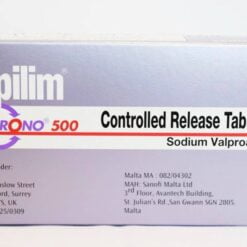
Cafergot
$137.76
Cafergot is a medication commonly used for the treatment of migraines and cluster headaches. It contains a combination of two active ingredients: ergotamine and caffeine. Ergotamine works by constricting blood vessels in the brain, reducing the intensity of headache symptoms, while caffeine helps enhance the absorption and effectiveness of ergotamine. Cafergot is typically taken at the onset of a migraine attack and can provide relief by reducing pain, nausea, and sensitivity to light and sound. It is available in different forms, including tablets and suppositories, and is prescribed by healthcare professionals based on individual needs and medical history.
Cafergot is a medication used to treat migraine headaches. It is a combination product containing two active ingredients: ergotamine and caffeine. Ergotamine belongs to a class of drugs called ergot alkaloids, which work by constricting blood vessels in the brain to help relieve the symptoms of migraines. Caffeine is included in Cafergot to enhance the absorption and effectiveness of ergotamine.
Dosage and Administration:
Cafergot is available in tablet form, and the dosage should be determined by your doctor based on your individual condition and response to treatment. The usual starting dose for adults is 2 tablets at the onset of a migraine attack, followed by 1 tablet every half hour until relief is obtained or a maximum of 6 tablets per attack. It is important to follow your doctor’s instructions and not exceed the recommended dosage.
Cafergot tablets should be taken at the first sign of a migraine headache. They can be taken with or without food, but taking them with food may help reduce stomach upset. Swallow the tablets whole with a full glass of water. Do not crush or chew the tablets.
It is important to note that Cafergot is not intended for daily use or for the prevention of migraines. It is specifically designed to treat acute migraine attacks.
Precautions:
Before taking Cafergot, inform your doctor about any medical conditions you have, especially if you have a history of heart disease, high blood pressure, liver or kidney problems, or if you are pregnant or breastfeeding. Cafergot should not be taken by individuals with uncontrolled high blood pressure, peripheral vascular disease, ischemic heart disease, or certain other conditions.
Cafergot may interact with other medications, including certain antibiotics, antifungal drugs, antidepressants, and medications used to treat HIV/AIDS. It is important to inform your doctor about all the medications you are taking to avoid potential interactions.
Possible Side Effects:
Cafergot may cause certain side effects in some individuals. Common side effects include nausea, vomiting, dizziness, weakness, and increased urination. These side effects are usually mild and temporary. However, if you experience any severe side effects such as chest pain, rapid heartbeat, severe abdominal pain, or signs of an allergic reaction (e.g., rash, itching, swelling), seek medical attention immediately.
In conclusion, Cafergot is a combination medication used for the acute treatment of migraine headaches. It contains ergotamine and caffeine, which work together to alleviate migraine symptoms by constricting blood vessels in the brain. The dosage should be determined by your doctor, and it is important to follow the prescribed instructions. Cafergot is not intended for daily use or prevention of migraines. Inform your doctor about any medical conditions and medications you are taking. If you experience severe side effects, seek medical attention promptly.
| Weight | 0.06 kg |
|---|---|
| Dimensions | 3 × 3 × 1 cm |
Related products
Zomig Rapimelt is a medication that comes in the form of orally disintegrating tablets (Slt) and is used to treat migraines. It belongs to a class of drugs called triptans, which work by narrowing blood vessels in the brain and reducing inflammation to alleviate migraine symptoms. The "rapimelt" formulation means that the tablet dissolves quickly on the tongue without the need for water, making it convenient for those experiencing migraines. Zomig Rapimelt is available in various strengths and should be taken as directed by a healthcare professional.


